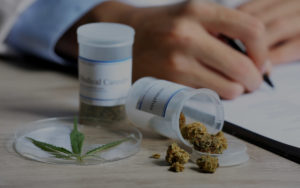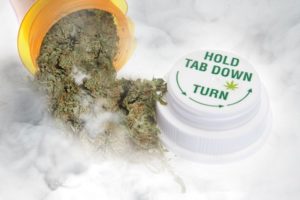- In 2019, Expert Opinion on Investigational Drugs published a review of the medical literature on the use of medical marijuana in cancer care. It found evidence that it may help cancer patients cope with chemotherapy-induced nausea and vomiting, cancer-related pain, anorexia and cachexia syndrome, insomnia and anxiety.
- In 2018, Current Pain Headache Reports published a review of randomized, controlled clinical trials involving medical cannabis for neuropathic pain, which is a common side effect of chemotherapy. Over the last 20 years, about a dozen clinical trials reported significant relief of neuropathic pain using marijuana over a placebo. The results and tolerability of marijuana for neuropathy was found comparable to prescription drugs.
- In 2015, Cochrane Database of Systematic Reviews published a review of 23 randomized, controlled clinical trials involving cancer patients receiving medical marijuana for nausea and vomiting caused by chemotherapy. The study reported that patients receiving marijuana experienced less nausea and vomiting than patients receiving a placebo.
Adult attention-deficit/hyperactivity disorder (ADHD) is a mental health disorder that includes a combination of persistent problems, such as difficulty paying attention, hyperactivity and impulsive behavior. Adult ADHD can lead to unstable relationships, poor work or school performance, low self-esteem, and other problems.
If you are suffering from ADHD or a similar condition, you must first get approval from the All Natural MD Florida Medical Marijuana Doctors Group who will approve your conditions and get you registered electronically for the medical marijuana card in Florida. All Natural MD has many locations in Florida. Please contact us to find a location near you. Call (800) 250-6737.
Though it’s called adult ADHD, symptoms start in early childhood and continue into adulthood. In some cases, ADHD is not recognized or diagnosed until the person is an adult.
Adult ADHD symptoms may not be as clear as ADHD symptoms in children. In adults, hyperactivity may decrease, but struggles with impulsiveness, restlessness and difficulty paying attention may continue.
All Natural MD Tampa South
711 S. Howard Ave, Suite V200, Tampa FL 33606
Treatment for adult ADHD is similar to treatment for childhood ADHD. Adult ADHD treatment includes medications, psychological counseling (psychotherapy) and treatment for any mental health conditions that occur along with ADHD. Find Medical Marijuana Doctors in Tampa FL today that can assist with treatment. Click Here.
Symptoms
ADHD symptoms start before age 12, and in some children, they’re noticeable as early as 3 years of age. ADHD symptoms can be mild, moderate or severe, and they may continue into adulthood. ADHD occurs more often in males than in females, and behaviors can be different in boys and girls. For example, boys may be more hyperactive and girls may tend to be quietly inattentive.
Most healthy children are inattentive, hyperactive or impulsive at one time or another. It’s typical for preschoolers to have short attention spans and be unable to stick with one activity for long. Even in older children and teenagers, attention span often depends on the level of interest.
1131 E Commercial Blvd, Oakland Park, FL 33334
The same is true of hyperactivity. Young children are naturally energetic they often are still full of energy long after they’ve worn their parents out. In addition, some children just naturally have a higher activity level than others do. Children should never be classified as having ADHD just because they’re different from their friends or siblings. Find Medical Marijuana Doctors in Fort Lauderdale FL today that can assist with treatment. Click Here.
Children who have problems in school but get along well at home or with friends are likely struggling with something other than ADHD. The same is true of children who are hyperactive or inattentive at home, but whose schoolwork and friendships remain unaffected.
ADHD, also called attention-deficit disorder, is a behavior disorder, usually first diagnosed in childhood, that is characterized by inattention, impulsivity, and, in some cases, hyperactivity. These symptoms usually occur together; however, one may occur without the other(s).
The symptoms of hyperactivity, when present, are almost always apparent by the age of 7 and may be present in very young preschoolers. Inattention or attention-deficit may not be evident until a child faces the expectations of elementary school.
ADHD is one of the most researched areas in child and adolescent mental health. However, the precise cause of the disorder is still unknown. Available evidence suggests that ADHD is genetic. It is a brain-based biological disorder. Low levels of dopamine (a brain chemical), which is a neurotransmitter (a type of brain chemical), are found in children with ADHD. Brain imaging studies using PET scanners (positron emission tomography; a form of brain imaging that makes it possible to observe the human brain at work) show that brain metabolism in children with ADHD is lower in the areas of the brain that control attention, social judgment, and movement.
If you are suffering from ADHD or a similar condition, you must first get approval from the All Natural MD Florida Medical Marijuana Doctors Group who will approve your conditions and get you registered electronically for the medical marijuana card in Florida. All Natural MD has many locations in Florida. Please contact us to find a location near you. Call (800) 250-6737.
It’s often said that depression results from a chemical imbalance, but that figure of speech doesn’t capture how complex the disease is. Research suggests that depression doesn’t spring from simply having too much or too little of certain brain chemicals. Rather, there are many possible causes of depression, including faulty mood regulation by the brain, genetic vulnerability, stressful life events, medications, and medical problems. It’s believed that several of these forces interact to bring on depression.
Researchers have learned much about the biology of depression. They’ve identified genes that make individuals more vulnerable to low moods and influence how an individual responds to drug therapy. One day, these discoveries should lead to better, more individualized treatment, but that is likely to be years away. And while researchers know more now than ever before about how the brain regulates mood, their understanding of the biology of depression is far from complete.
All Natural MD Lakeland
1102 Florida Ave S Suite 102, Lakeland, FL 33803
(800) 250-6737
Depression is not only common but it is also a serious mental illness that negatively affects the thought process, personal behaviors and physical well-being. Most depressed people report feelings of sadness, decreased quality of life, physical and emotional issues and less interest in activities. Other symptoms include fatigue, feelings of guilt or worthlessness, trouble sleeping, suicidal thoughts, appetite issues and chronic depressed mood. Therefore, depression can highly affect your school, work and relationships.
Every part of your body, including your brain, is controlled by genes. Genes make proteins that are involved in biological processes. Throughout life, different genes turn on and off, so that in the best case they make the right proteins at the right time. But if the genes get it wrong, they can alter your biology in a way that results in your mood becoming unstable. In a person who is genetically vulnerable to depression, any stress can then push this system off balance.
Mood is affected by dozens of genes, and as our genetic endowments differ, so do our depressions. The hope is that as researchers pinpoint the genes involved in mood disorders and better understand their functions, depression treatment can become more individualized and more successful. Patients would receive the best medication for their type of depression.
All Natural MD Sarasota
677 N Washington Blvd, Sarasota, FL 34236
(800) 250-6737
Another goal of gene research, of course, is to understand how, exactly, biology makes certain people vulnerable to depression. For example, several genes influence the stress response, leaving us more or less likely to become depressed in response to trouble.
Perhaps the easiest way to grasp the power of genetics is to look at families. It is well known that depression and bipolar disorder run in families. The strongest evidence for this comes from the research on bipolar disorder. Half of those with bipolar disorder have a relative with a similar pattern of mood fluctuations. Studies of identical twins, who share a genetic blueprint, show that if one twin has bipolar disorder. These numbers don’t apply to fraternal twins, who like other biological siblings share only about half of their genes. If one fraternal twin has bipolar disorder, the other has a 25% chance of developing it.
The evidence for other types of depression is more subtle, but it is real. A person who has a first-degree relative who suffered major depression has an increase in risk for the condition of 1.5% to 3% over normal.
Studies on effects of medical marijuana on depression are still in the early stages. Researchers suggest that the possible benefits include mood stabilization and normal endocannabinoid function restoration. Scientists are already looking into medical marijuana and its ability to cure depression resulting from chronic stress.
All Natural MD Florida
In Florida, you can’t simply walk into a medical cannabis dispensary and purchase ounces of the highest grade of marijuana. You must first get approval from an All Natural MD Medical Marijuana Doctor who will get you registered electronically for medical marijuana card in Florida. All Natural MD has many locations in Florida. Please contact us to find a location near you in Sarasota, Lakeland and many more. (800) 250-6737.



